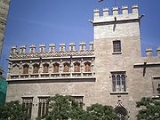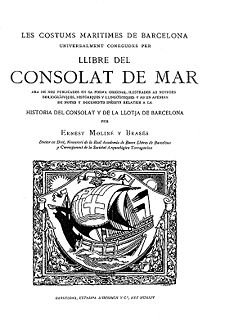
Consulate of the Sea
Encyclopedia

Crown of Aragon
The Crown of Aragon Corona d'Aragón Corona d'Aragó Corona Aragonum controlling a large portion of the present-day eastern Spain and southeastern France, as well as some of the major islands and mainland possessions stretching across the Mediterranean as far as Greece...
, later to spread throughout the Mediterranean basin
Mediterranean Sea
The Mediterranean Sea is a sea connected to the Atlantic Ocean surrounded by the Mediterranean region and almost completely enclosed by land: on the north by Anatolia and Europe, on the south by North Africa, and on the east by the Levant...
, to administer maritime
Admiralty law
Admiralty law is a distinct body of law which governs maritime questions and offenses. It is a body of both domestic law governing maritime activities, and private international law governing the relationships between private entities which operate vessels on the oceans...
and commercial law
Commercial law
Commercial law is the body of law that governs business and commercial transactions...
. The term may also refer to a celebrated collection of maritime customs and ordinances in Catalan, also known in English as The Customs of the Sea, compiled over the fourteenth and 15th centuries and published at Barcelona
Barcelona
Barcelona is the second largest city in Spain after Madrid, and the capital of Catalonia, with a population of 1,621,537 within its administrative limits on a land area of...
in or before 1494.
In the 21st century, the Catalan term Consolat de mar is used for a commercial arbitration
Arbitration
Arbitration, a form of alternative dispute resolution , is a legal technique for the resolution of disputes outside the courts, where the parties to a dispute refer it to one or more persons , by whose decision they agree to be bound...
service operated by the Barcelona Chamber of Commerce
Chamber of commerce
A chamber of commerce is a form of business network, e.g., a local organization of businesses whose goal is to further the interests of businesses. Business owners in towns and cities form these local societies to advocate on behalf of the business community...
, and also for a series of trade-promotion offices operated by the city of Barcelona.
Medieval institution

James I of Aragon
James I the Conqueror was the King of Aragon, Count of Barcelona, and Lord of Montpellier from 1213 to 1276...
in 1258. This gave Barcelona merchants the right to settle their commercial disputes without interference from the royal courts: in return, the king received much needed financial support for his wars of expansion. Mercantile Law (ius mercadorium) was becoming established at the same time through much of Europe, and similar bodies had already been established in Messina (first third of the 13th century) and Genoa
Genoa
Genoa |Ligurian]] Zena ; Latin and, archaically, English Genua) is a city and an important seaport in northern Italy, the capital of the Province of Genoa and of the region of Liguria....
(1250).
As the territories of the Crown of Aragon
Crown of Aragon
The Crown of Aragon Corona d'Aragón Corona d'Aragó Corona Aragonum controlling a large portion of the present-day eastern Spain and southeastern France, as well as some of the major islands and mainland possessions stretching across the Mediterranean as far as Greece...
expanded, it was customary to establish new Consulates of the Sea in the major ports. One of the earliest was in Valencia (1283), where the charter of Peter I of Aragon makes it clear that disputes are to be settled "according to maritime customs, as these are accepted in Barcelona."
Book of the Consulate of the Sea

Bibliothèque nationale de France
The is the National Library of France, located in Paris. It is intended to be the repository of all that is published in France. The current president of the library is Bruno Racine.-History:...
in Paris
Paris
Paris is the capital and largest city in France, situated on the river Seine, in northern France, at the heart of the Île-de-France region...
. The epistle dedicatory states that the work is an amended version of the Book of the Consulate of the Sea, compiled by Francis Celelles with the assistance of numerous shipmasters and merchant
Merchant
A merchant is a businessperson who trades in commodities that were produced by others, in order to earn a profit.Merchants can be one of two types:# A wholesale merchant operates in the chain between producer and retail merchant...
s well versed in maritime affairs.
According to a statement made by Capmany
Antonio de Capmany y Montpalau
Antonio de Capmany y Montpalau , Spanish polygraph, was born at Barcelona.Antonio took part in the 1762 Spanish campaign in Portugal. He retired from the army in 1770, and was subsequently elected secretary of the Royal Academy of History at Madrid...
in his Codigo de los costumbras maritimas de Barcelona, published at Madrid
Madrid
Madrid is the capital and largest city of Spain. The population of the city is roughly 3.3 million and the entire population of the Madrid metropolitan area is calculated to be 6.271 million. It is the third largest city in the European Union, after London and Berlin, and its metropolitan...
in 1791, there was extant to his knowledge an older edition, printed in semi-Gothic characters, which he believed to be of a date prior to 1484.
There are, however, two Catalan manuscripts preserved in the Bibliothèque nationale de France, the earliest of which, being MS. Espagnol 124, contains the two first treatises which are printed in the Book of the Consulate of the Sea of 1494, and which are the most ancient portion of its contents, written in a hand of the 14th century, on paper of that century. The subsequent parts of this manuscript are on paper of the 15th century, but there is no document of a date more recent than 1436. The later of the two manuscripts, being MS. Espagnol 56, is written throughout on paper of the 15th century, and in a hand of that century, and it purports, from a certificate on the face of the last leaf, to have been executed under the superintendence of Peter Thomas, a notary public
Notary public
A notary public in the common law world is a public officer constituted by law to serve the public in non-contentious matters usually concerned with estates, deeds, powers-of-attorney, and foreign and international business...
, and the scribe of the Consulate of the Sea at Barcelona.
The edition of 1494 contains, in the first place, a code of procedure issued by the kings of Aragon
Aragon
Aragon is a modern autonomous community in Spain, coextensive with the medieval Kingdom of Aragon. Located in northeastern Spain, the Aragonese autonomous community comprises three provinces : Huesca, Zaragoza, and Teruel. Its capital is Zaragoza...
for the guidance of the courts of the consuls of the sea, in the second place, a collection of ancient customs of the sea, and thirdly, a body of rules for the government of cruisers of war. A colophon
Colophon (publishing)
In publishing, a colophon is either:* A brief description of publication or production notes relevant to the edition, in modern books usually located at the reverse of the title page, but can also sometimes be located at the end of the book, or...
at the end of these ordinances informs the reader that the book commonly called the Book of the Consulate of the Sea ends here; after which there follows a document known by the title of The Acceptations, which purports to record that the previous chapters and ordinances had been approved by the "Roman" people in 1075, and by various princes and peoples in the 12th and 13th centuries: this is generally regarded as of no historical value. The paging of the edition of 1494 ceases with this document, at the end of which is the printer's colophon, reciting that the work was completed on the 14 July 1494, at Barcelona, by Pere Posa, priest and printer.
The remainder of the volume consists of what may be regarded as an appendix to the original Book of the Consulate. This appendix contains various maritime ordinances of the kings of Aragon and of the councillors of the city of Barcelona, ranging over a period from 1271 to 1493. It is printed apparently in the same type with the preceding part of the volume. The original Book of the Consulate of the Sea, coupled with this appendix, circulated in Europe under the title, The Consulate of the Sea, and in the 16th century was translated into the Castilian
Spanish language
Spanish , also known as Castilian , is a Romance language in the Ibero-Romance group that evolved from several languages and dialects in central-northern Iberia around the 9th century and gradually spread with the expansion of the Kingdom of Castile into central and southern Iberia during the...
, the Italian
Italian language
Italian is a Romance language spoken mainly in Europe: Italy, Switzerland, San Marino, Vatican City, by minorities in Malta, Monaco, Croatia, Slovenia, France, Libya, Eritrea, and Somalia, and by immigrant communities in the Americas and Australia...
, and the French language
French language
French is a Romance language spoken as a first language in France, the Romandy region in Switzerland, Wallonia and Brussels in Belgium, Monaco, the regions of Quebec and Acadia in Canada, and by various communities elsewhere. Second-language speakers of French are distributed throughout many parts...
s. The Italian translation, printed at Venice c. 1549 by Jean Baptista Pedrezano, was the version that obtained the largest circulation in the north of Europe, and led many jurists to suppose the work to have been of Italian origin. In the next century, the work was translated into Dutch
Dutch language
Dutch is a West Germanic language and the native language of the majority of the population of the Netherlands, Belgium, and Suriname, the three member states of the Dutch Language Union. Most speakers live in the European Union, where it is a first language for about 23 million and a second...
by Westerven, and into German
German language
German is a West Germanic language, related to and classified alongside English and Dutch. With an estimated 90 – 98 million native speakers, German is one of the world's major languages and is the most widely-spoken first language in the European Union....
by Engelbrecht, and it is also said to have been translated into Latin. An excellent translation into French of The Customs of the Sea, which are the most valuable portion of the Book of the Consulate, was published by Pardessus
Jean Marie Pardessus
Jean Marie Pardessus , was a French lawyer.He was born at Blois, and educated by the Oratorians, then studied law, at first under his father, a lawyer at the Presidial, who was a pupil of Robert Joseph Pothier. In 1796, after the Reign of Terror, Pardessus married, but his wife died after three years...
in the second volume of his Collection des lois maritimes (Paris, 1834), under the title of La Compilation connue sous le nom do consulat de la mer. See introduction, by Sir Travers Twiss
Travers Twiss
Sir Travers Twiss QC FRS was an English jurist.Twiss was the eldest son of the Rev. Robert Twiss. At University College, Oxford, he obtained a first-class degree in mathematics and a second in classics in 1830, and was elected a Fellow of his college, of which he was afterwards successively...
, to the Black Book of the Admiralty
Black book of the admiralty
The Black Book of the Admiralty is a compilation of English admiralty law created over the course of several English monarchs' reigns, including the most important decisions of the High Court of Admiralty. Its starting point is the Rolls of Oléron, which were promulgated in c. 1160 by Eleanor...
(London, 1874), which in the appendix to vol. iii, contains his translation of The Customs of the Sea, with the Catalan text.

